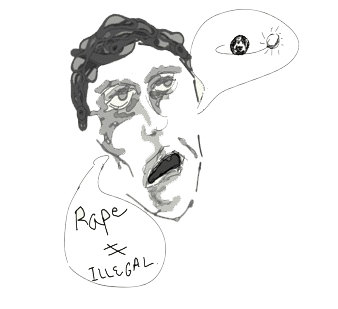Following the conviction of two high school football players in Steubenville, Ohio for raping a drunk and unconscious 16-year-old girl, University of Rochester professor Steven Landsburg published a blog post that posed a series of hypothetical questions regarding whether psychological harm should have any weight in public policy decisions.
Landsburg’s post was met with serious backlash, with some people going so far as to call for his firing. The implications of Landsburg’s post appear to be unfortunate, misguided and offensive, but to censure or fire him is a clear abuse of one of the most important, and academically pertinent, universal rights: the right to free speech.
In his blog post, Landsburg notes the hypothetical situation of someone who is “raped while unconscious in a way that causes no direct physical harm — no injury, no pregnancy, no disease transmissions” but who nevertheless suffers severe trauma and psychological damage from the knowledge of being treated in such a way. Landsburg questioned whether the law should protect individuals from rape while unconscious. Although Landsburg later clarified the post was intended to “draw lines between purely psychic harm that should receive policy weight and purely psychic harm that shouldn’t,” he is currently facing fierce backlash online and on campus from women’s rights groups calling for Landsburg’s censure or dismissal from the university.
Daniel Nelson, the graduate student who created the student petition to dismiss Landsburg on http://change.org, argued, “the illegality of rape is not a debatable issue.” As evidenced through the media’s sympathetic coverage of Steubenville, as well as the various movements in support of victims of sexual abuse (e.g. the College of William and Mary’s own “William and Mary Stands with Survivors” initiative), the “debate” over whether rape should be illegal is rarely spoken of. The illegality of rape, however, surely has the capacity to be debated, just like the illegality of extortion, money laundering and sex with minors. All these issues can be debated, and individuals should feel free to express their opinions regarding issues that are socially, perhaps even legally, set in stone.
It is within anyone’s rights to express disgust with Landsburg’s opinions. At the same time, it is equally within Landsburg’s rights to exercise free speech, regardless of how backward and reprehensible the content may be. The issue at hand is not a matter of determining the correctness of speech, but of ensuring that individuals can say what they want.
If confronted with similar circumstances, colleges and universities around the country should follow University of Rochester President Joel Seligman’s decision to protect Landsburg’s freedom of speech and take no action against him. It is absolutely essential for institutions of higher education to protect their members’ intellectual freedom, even when it comes in the form of unpopular and provocative statements. This is not to say Landsburg will go unpunished; certainly student and online activism will leave their mark on his professional reputation and comfort. Nevertheless, the principles of free speech cannot be institutionally denied.
Email Beatrice Loayza at bloayza@email.wm.edu


































While I agree that the legality of rape has the capacity to be debated, I’d like to point out that Landsburg did not propose such a debate. His thought experiment depended on the contrast between the rape case and other similarly stated cases that were not evidently repugnant.
That is, the answer to the controversial question is presumed to be “no,” and the work of the experiment consists of explaining that answer. If the answer were otherwise, the experiment would fail altogether, and there would have been no point in posing it. Many quotations of Landsburg by his protestors fail to acknowledge this context.
I am a philosophy alum of the College, and I would hope for a liberal education to continue supporting not only the freedom of speech, but also the capacity to recognize, and participate in, the forms of critical thought.